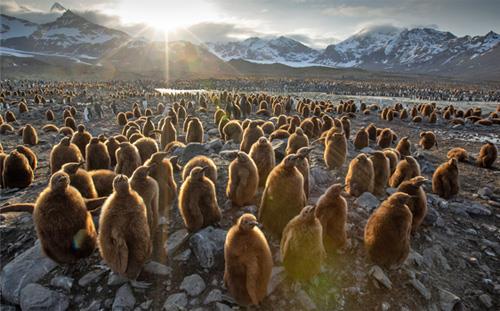
BBC America's latest splendid nature series reminds us again that Earth changes constantly and rapidly.
That sounds like a platitude. Seven Worlds, One Planet, which premieres at 9 p.m. ET on Saturday over BBCA, AMC, IFC, and Sundance, politely reminds us it's more like a warning.
Seven Worlds consists of seven episodes, one for each of the planet's continents. It focuses on wildlife unique to each of those continents, interspersed with narrator Sir David Attenborough's crisp vignettes on that continent's geological history.
The series opens with the episode on Australia, which moved to the front of the queue because of its ongoing epidemic of deadly wildfires.
Since Seven Planets was shot and edited months ago, it has no specific footage on or reference to the wildfires. Viewers won't have trouble connecting the dots, however, since Attenborough notes that Australia is the driest continent on Earth, with 70% of its land area getting virtually no rain.
Besides being dry, it's also hot, and since it is now midsummer there, fire doesn't seem like a surprising result.
The poignancy comes from seeing who lives in the forests that are burning. The cuddy koala bears are the poster victims, of course, but Seven Worlds points out that hundreds of other species make their home there, like the fascinating flying foxes.
Tens of millions of years ago, Australia broke away from Antarctica and drifted north, moving it into a more temperate zone and giving it a unique situation among continents.
Because it had no land connection to other continents, the unique reptiles, mammals, and other life there faced fewer predators and thus were able to survive where similar species elsewhere eventually vanished.
In keeping with BBC nature series of the past, Seven Worlds shows us a few of the marquee species, like kangaroos and then gives equal or greater time to, for instance, the deadly multi-eyed spid-a-boo.
We see rare footage of dingo pups following their mother on a hunt and intriguing footage of Tasmanian devils, who were doing just fine for millennia until modern man showed up a couple of hundred years ago and started making wholesale changes in the ecology. Now Tasmanian devils are severely endangered.
Drone cameras, which are revolutionizing many areas of the film and video industries, come into play here with aerial shots of a shark feeding frenzy in shallow coastal waters.
Sharks, Attenborough notes, were plying these waters 200 million years before the dinosaurs showed up. Now that's a species built to last.
That's also the kind of geological statistic that Seven Worlds clearly hopes will leave a lasting impression. Earth has been around for a very long time, and yet many of its most dangerous changes and threats have emerged only in the few thousand years since humans showed up and started exploiting its resources for their convenience and pleasure.
Attenborough never hectors the viewer for a second. Seven Worlds scolds nobody and can be watched purely as a lovely documentary on the wonders of the world.
But it also carries the tacit reminder that as stewards of that world, we need to behave in ways that do not damage it. We have not always done so, and the longer we deny our responsibility, the greater the damage.
If we want our children and theirs to know these same wonders, we need to treat the planet with the same care and common sense that we would treat our house – because that's what Earth is. It's our house, with a whole lot of rooms that have really cool stuff.